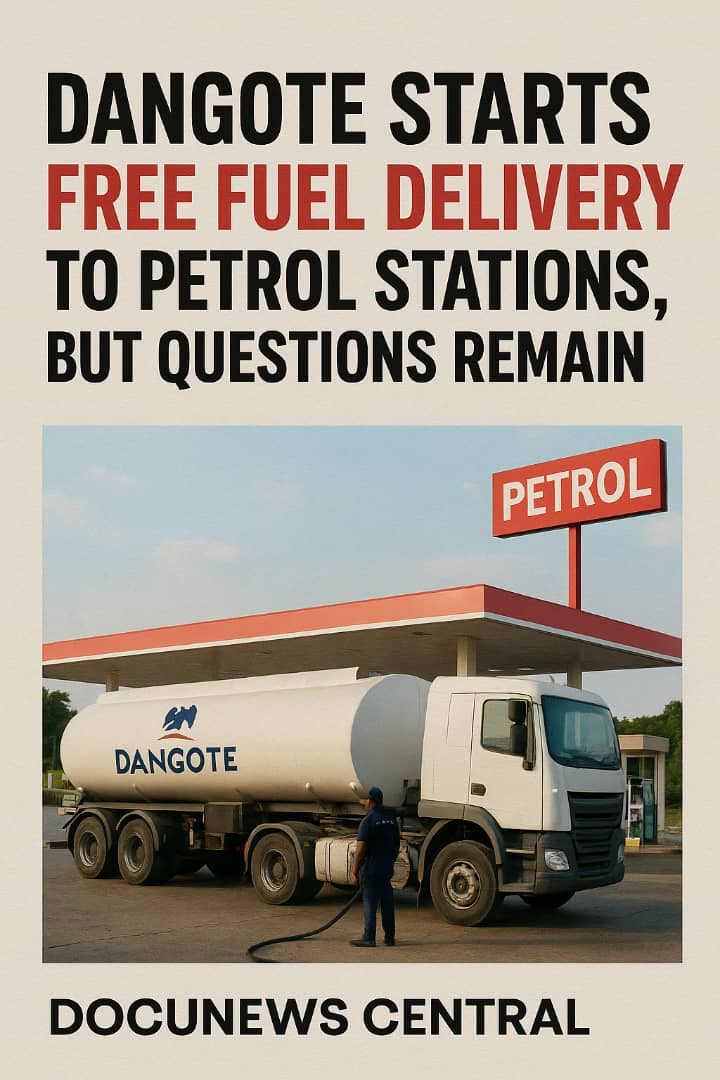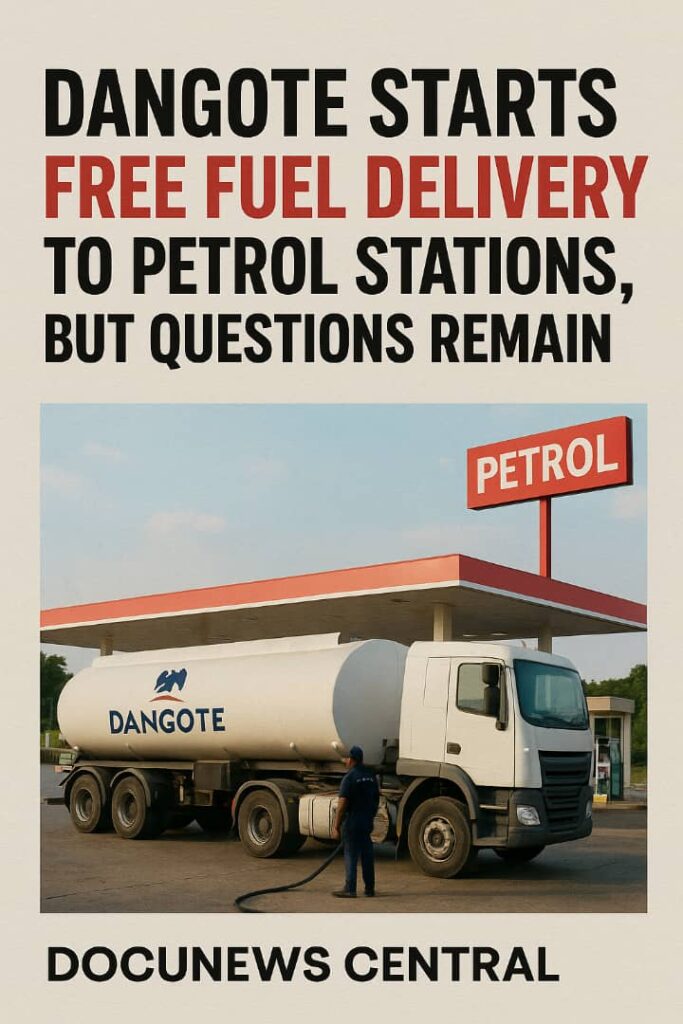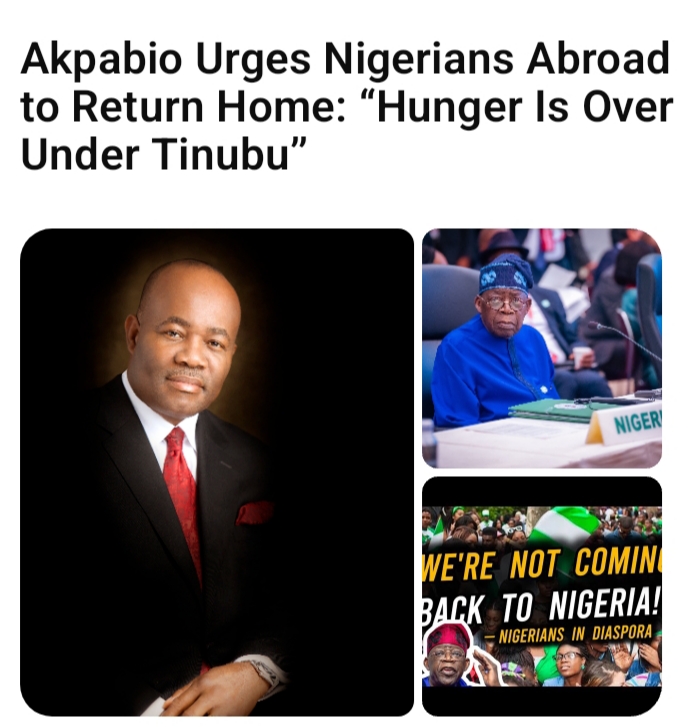

Dangote Starts Free Fuel Delivery to Petrol Stations, but Questions Remain
DocuNews Central – The long-awaited direct supply of petrol from the giant Dangote Refinery has now begun.
It comes with a bold claim: free delivery of fuel to petrol stations.
Many Nigerians welcome the news.
Yet the full story shows the plan is more complex than a single headline.
A New Era in Fuel Supply
For decades, Nigeria’s fuel market has relied on middlemen and depots.
Marketers lifted products from coastal depots and hauled them across the country.
This old chain created high costs and frequent scarcity.
Aliko Dangote’s refinery, a $20 billion project in Lagos, promises a new way.
It can process 650,000 barrels of crude oil each day when at full speed.
The management now says fuel will go straight from the refinery to filling stations.
They call the new service “free delivery.”
What “Free Delivery” Means
In plain words, Dangote will not charge extra for trucking petrol to approved stations.
Marketers will no longer hire outside transporters for those loads.
The refinery is using its own new fleet of trucks to move the product.
Company officials say the step will lower costs at the pump.
They hope to cut the final price of Premium Motor Spirit, known as PMS or petrol.
Early reports show a gantry price of about N820 per litre at the refinery gate.
Retail pump prices may hover around N841 in Lagos and the South-West.
Other states like Abuja, Rivers, Delta and Edo may see about N851 per litre.
Initial Rollout, Not Yet Nationwide
The refinery wants to reach all of Nigeria.
But the plan begins with only about a dozen states.
The South-West and parts of the South-South get the first trucks.
Managers say more states will join in phases.
The goal is nationwide supply, but no exact date is set.
Some of the needed trucks are still on the way from overseas.
Shipping delays have slowed the wider rollout.
The CNG Truck Fleet
A key part of the plan is a new set of Compressed Natural Gas (CNG) trucks.
These trucks are cleaner than diesel and cheaper to run.
They will move petrol, diesel and other products directly to petrol stations.
The company also plans CNG “booster” stations.
These stations will help refill the new fleet and keep deliveries steady.
The move fits Nigeria’s broader push to cut emissions and fuel costs.
Hopes for Cheaper Petrol
Consumers are watching prices closely.
Many Nigerians have faced high pump prices since the removal of fuel subsidy.
Some pay well over N900 per litre in distant areas.
Dangote officials believe their model will cut transport costs.
Lower haulage costs should mean lower retail prices.
That is why the phrase “free delivery” excites motorists and commuters.
Early figures suggest a small drop already.
But it may take weeks before buyers in every state feel the change.
Marketers Welcome, but Raise Concerns
Petrol marketers, grouped in trade bodies, say the plan is bold.
They agree that direct supply can end years of middleman charges.
But some warn that the phrase “free delivery” may mislead the public.
The Depot and Petroleum Products Marketers Association of Nigeria (DAPPMAN) voiced caution.
They say marketers must still lift at least 25 percent of their allocation themselves.
This means some product still requires self-haulage and its own cost.
They also note that some deliveries may involve Dangote trucks only.
Marketers may not always choose their own transport firms.
So while the service is helpful, it is not a total removal of logistics costs.
Official Reaction
Regulators welcome the start of direct supply.
The Nigerian Midstream and Downstream Petroleum Regulatory Authority (NMDPRA) has monitored the project.
Officials say a healthy market needs more direct players.
Government leaders hope the refinery will reduce import bills.
Nigeria has long imported most of its petrol despite being a major crude producer.
The Dangote project could change that balance in the coming years.
Public Excitement
On social media, many Nigerians cheer the news.
Taxi drivers, bus operators and small businesses hope for cheaper fuel.
Households that rely on petrol generators also watch with hope.
Some users post videos of the first Dangote trucks arriving at filling stations.
Others share price boards showing lower figures than in recent months.
Yet a few users urge caution, reminding people that prices vary by region.
Economic Impact
Economists say direct supply could slow inflation.
Lower transport costs ripple through food and goods prices.
Nigeria’s high cost of living makes any relief important.
Lower petrol prices could also cut the cost of moving goods by road.
This may help farmers and traders.
Industries that depend on diesel and petrol may also spend less.
However, experts warn that global crude prices and exchange rates still matter.
If oil prices rise or the naira weakens, pump prices may climb again.
Challenges Ahead
Dangote’s plan faces hurdles.
Moving fuel across Nigeria requires good roads and safe routes.
Some highways suffer from potholes and security risks.
The refinery must also manage a huge fleet of trucks.
Drivers need training and steady CNG supply.
Any gap in those areas could delay deliveries.
In addition, older depots and marketers may resist change.
Some have long profited from the old chain of supply.
Competition may bring disputes over price and access.
Timeline of the Project
The idea of the Dangote Refinery started more than a decade ago.
Construction began in 2016 on a site in Lekki, Lagos.
Delays and funding hurdles slowed progress.
The refinery finally produced its first diesel and aviation fuel in early 2024.
Petrol output followed months later after more test runs.
Now, in late 2025, direct delivery of petrol is under way.
Wider Energy Ambitions
Dangote plans more than just petrol.
The complex includes a petrochemical plant and fertilizer plant.
These could boost Nigeria’s industrial growth.
Officials also speak of export plans.
Excess diesel and jet fuel could go to West African neighbours.
Such trade may bring foreign currency into Nigeria.
Why This Matters to Nigerians
For millions of Nigerians, fuel cost is daily news.
Transport fares, food prices and even school fees can depend on it.
Cheaper petrol means cheaper goods and easier travel.
The refinery’s move to deliver fuel directly offers hope.
It could break decades of dependence on imported refined fuel.
It could also reduce the impact of unstable global markets.
Voices from the Streets
DocuNews Central spoke with drivers in Lagos and Abuja.
Many praised the effort and expect lower costs soon.
One taxi driver said, “If the pump price drops even N20, it helps my family.”
A shop owner in Port Harcourt said, “I run a generator every night.
Lower petrol cost means lower bills and more profit.”
But some remain cautious.
A bus operator in Kano said, “We hear it is free delivery.
But until prices drop in the North, we wait and see.”
Looking Forward
The coming months will show if the refinery can keep promises.
Will all states get free delivery?
Will prices stay low despite world oil swings?
Industry watchers say patience is needed.
It is a giant project with many moving parts.
If it succeeds, Nigeria may finally end its long petrol crisis.
Final Word
Dangote’s start of free fuel delivery to petrol stations is a major step.
It signals a new chapter for Nigeria’s energy sector.
The move can ease pump prices and help millions of families.
But “free delivery” is not absolute.
Some marketers still bear part of the lifting cost.
Nationwide coverage will take time.
Nigerians welcome the change but remain watchful.
DocuNews Central will keep tracking the story as it unfolds.
DocuNews Central Reporting.









